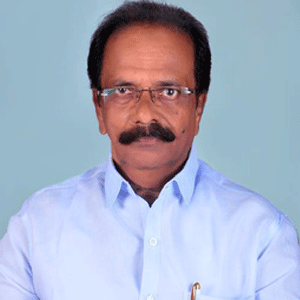- Home
- Magazines
- Spinning Mills From India
- Ranking
- Kollam Co Operative Spinning Mills

A. R. Basheer , Chairman
The textile industry in India faces challenges such as lower productivity, high raw material costs, and outdated technology. These challenges may affect the profitability and mills’ competitions in the rapidly growing textile market. In southern Kerala, Kollam Co-operative Spinning Mills (KCSM) is setting a new high in terms of resilience, reform, and responsible public sector action in India. On February 13, 1976 under the Co-operative Societies Act, the mill has for so long been a radiant source of socio-economic growth offering cost-effective raw materials, solutions to the industry. Now, with the help of visionary leadership and governmental support, KCSM is coming out as a model of sustainable revival and modernization, one spindle at a time.
KCSM’s journey is anything but ordinary. Once sprawling across 8.95 acres many co-operative enterprises, it en-countered harsh blows. The 2018 Kerala floods, followed by the COVID-19 pandemic, led to halted operations, reduced workforce, and partial implementation of modernization plan. Yet, this wasn’t the end. With only 7,296 spindles in-stalled Phase I and limited capital infusion, KCSM embarked on a remarkable revival journey driven by fiscal discipline, digital transformation, and stakeholder accountability.
Spinning Progress with Precision & Digitally Driven
The Phase I modernization under the NCDC assistance scheme, inaugurated in 2021 by Kerala’s Hon’ble Chief Minister, was the turning point. With an investment of ₹26.28 crore, the mill has installed 7296 ring spindles, marking the rebirth of its spinning capacity. Phase II is now underway, with modern winding machinery already commissioned, including 4 Link Coner machines. Importantly, KCSM’s productivity now exceeds industry benchmarks, delivering an average of 130 grams per spindle per shift against the national average of 116 grams, and yarn CSP above 4816 a hallmark of exportgrade quality.
 KCSM’s commitment to sustainability and efficiency is not mere rhetoric. It is one of the few spinning mills in India to receive “A” Grade certification from the Haritha Kerala Mission for Green Protocol compliance, and it has completed a Detailed Project Report (DPR) for an 850 kWp rooftop solar project, approved and set for execution by mid-2025.
KCSM’s commitment to sustainability and efficiency is not mere rhetoric. It is one of the few spinning mills in India to receive “A” Grade certification from the Haritha Kerala Mission for Green Protocol compliance, and it has completed a Detailed Project Report (DPR) for an 850 kWp rooftop solar project, approved and set for execution by mid-2025.
KCSM has completely migrated from paper-based process into a digital platform whereby they have adopted 100 percent ERP Production System, Electronic Biometric Attendance and E-Office implementation for paperless governance. These smart systems make it possible to practically control the production process in real-time, optimize the workforce management, and guarantee complete statutory compliance, making KCSM the first digitally governed spinning mill in Kerala.
Leadership That Inspires Transformation & People-Centric Approach
At the heart of KCSM revival is visionary leadership of Chairman A.R Basheer and Managing Director Umesh Krishnan. With more than three decades of industrial experience, A.R. Basheer has led the way for this mill with enduring endeavours to infrastructure expansion, sustainability, and a sense of accountability. Umesh Krishnan is the master behind financial strategy, operational excellence, and intelligent automation, and has spearheaded the transformative change, bringing KCSM to a new standard of performance-driven development in the country’s textile industry. Joined, their leadership has cut down losses incurred on a monthly basis from 40 lakh to 10 lakh rupees, cleared KSEB dues as well as obtained an interest waiver on debts through an OTS model of debt restructuring, thus guaranteeing financial sustain¬ability and operational feasibility.
Unlike its counterparts in the private sector, KCSM rests on cooperative principles with social upliftment coupled with profitability. Since then KCSM has recorded zero lay-off while paying statutory dues & gratuity to 204 lay-off workers. The mill helps young people by continuing to develop their skills through the provision of training programs and industrial internships. Outside of its 113 permanent employees, the company runs efficiently, transcending modern cooperative, conjoining profit, people, and purpose, establishing a yardstick for sustainable and community-driven business in India’s spinning industry.
Diversification & the Road Ahead
KCSM is diversifying its revenue sources beyond traditional yarn manufacture. By 2025, there is a new IOCL petrol retail outlet in the pipeline in mid-2025, and not-so-usable godowns and land parcels are being leased for reliable monthly income. The company is also extending its wings to the healthcare business with value-added products such as hygienic napkins and the pursuit for ISO 9001 certification for international quality standards. These initiatives guarantee financial stability, operational scalability, and long-term sustainability in a price-volatile environment and the global competitive context.
Kollam Co-operative Spinning Mills is a case of public sector revival, bringing digital governance, sustainability, and cooperative values. As the textile industry in India is aiming to achieve $100 billion by 2030, KCSM is all set to create history as a transformative movement. “We are committed to producing high-quality yarn products while minimizing our environmental footprint. KCSM is not just our workplace it is our mission”, says A.R. Basheer, Chairman, KCSM.
KCSM’s journey is anything but ordinary. Once sprawling across 8.95 acres many co-operative enterprises, it en-countered harsh blows. The 2018 Kerala floods, followed by the COVID-19 pandemic, led to halted operations, reduced workforce, and partial implementation of modernization plan. Yet, this wasn’t the end. With only 7,296 spindles in-stalled Phase I and limited capital infusion, KCSM embarked on a remarkable revival journey driven by fiscal discipline, digital transformation, and stakeholder accountability.
Spinning Progress with Precision & Digitally Driven
The Phase I modernization under the NCDC assistance scheme, inaugurated in 2021 by Kerala’s Hon’ble Chief Minister, was the turning point. With an investment of ₹26.28 crore, the mill has installed 7296 ring spindles, marking the rebirth of its spinning capacity. Phase II is now underway, with modern winding machinery already commissioned, including 4 Link Coner machines. Importantly, KCSM’s productivity now exceeds industry benchmarks, delivering an average of 130 grams per spindle per shift against the national average of 116 grams, and yarn CSP above 4816 a hallmark of exportgrade quality.
 KCSM’s commitment to sustainability and efficiency is not mere rhetoric. It is one of the few spinning mills in India to receive “A” Grade certification from the Haritha Kerala Mission for Green Protocol compliance, and it has completed a Detailed Project Report (DPR) for an 850 kWp rooftop solar project, approved and set for execution by mid-2025.
KCSM’s commitment to sustainability and efficiency is not mere rhetoric. It is one of the few spinning mills in India to receive “A” Grade certification from the Haritha Kerala Mission for Green Protocol compliance, and it has completed a Detailed Project Report (DPR) for an 850 kWp rooftop solar project, approved and set for execution by mid-2025. “With the help of visionary leadership and governmental support, KCSM is coming out as a model of sustainable revival and modernization, one spindle at a time
KCSM has completely migrated from paper-based process into a digital platform whereby they have adopted 100 percent ERP Production System, Electronic Biometric Attendance and E-Office implementation for paperless governance. These smart systems make it possible to practically control the production process in real-time, optimize the workforce management, and guarantee complete statutory compliance, making KCSM the first digitally governed spinning mill in Kerala.
Leadership That Inspires Transformation & People-Centric Approach
At the heart of KCSM revival is visionary leadership of Chairman A.R Basheer and Managing Director Umesh Krishnan. With more than three decades of industrial experience, A.R. Basheer has led the way for this mill with enduring endeavours to infrastructure expansion, sustainability, and a sense of accountability. Umesh Krishnan is the master behind financial strategy, operational excellence, and intelligent automation, and has spearheaded the transformative change, bringing KCSM to a new standard of performance-driven development in the country’s textile industry. Joined, their leadership has cut down losses incurred on a monthly basis from 40 lakh to 10 lakh rupees, cleared KSEB dues as well as obtained an interest waiver on debts through an OTS model of debt restructuring, thus guaranteeing financial sustain¬ability and operational feasibility.
Unlike its counterparts in the private sector, KCSM rests on cooperative principles with social upliftment coupled with profitability. Since then KCSM has recorded zero lay-off while paying statutory dues & gratuity to 204 lay-off workers. The mill helps young people by continuing to develop their skills through the provision of training programs and industrial internships. Outside of its 113 permanent employees, the company runs efficiently, transcending modern cooperative, conjoining profit, people, and purpose, establishing a yardstick for sustainable and community-driven business in India’s spinning industry.
Diversification & the Road Ahead
KCSM is diversifying its revenue sources beyond traditional yarn manufacture. By 2025, there is a new IOCL petrol retail outlet in the pipeline in mid-2025, and not-so-usable godowns and land parcels are being leased for reliable monthly income. The company is also extending its wings to the healthcare business with value-added products such as hygienic napkins and the pursuit for ISO 9001 certification for international quality standards. These initiatives guarantee financial stability, operational scalability, and long-term sustainability in a price-volatile environment and the global competitive context.
Kollam Co-operative Spinning Mills is a case of public sector revival, bringing digital governance, sustainability, and cooperative values. As the textile industry in India is aiming to achieve $100 billion by 2030, KCSM is all set to create history as a transformative movement. “We are committed to producing high-quality yarn products while minimizing our environmental footprint. KCSM is not just our workplace it is our mission”, says A.R. Basheer, Chairman, KCSM.
🍪 Do you like Cookies?
We use cookies to ensure you get the best experience on our website. Read more...

